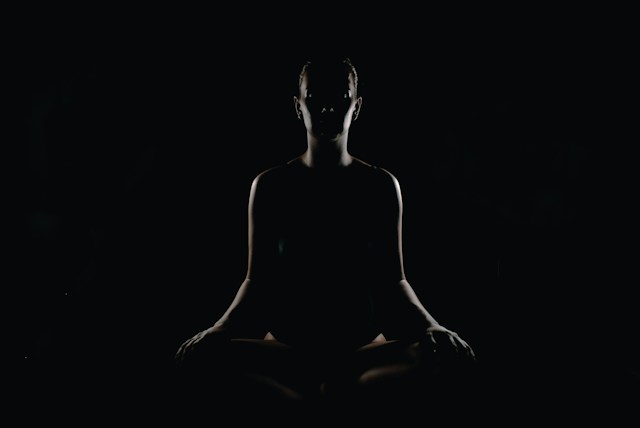Although meditation has been practised for thousands of years, it has just recently come to light because of its possible benefit in treating depression. The goal of this potent mindfulness practice is to attain mental clarity and emotional stability by focusing one’s attention on a specific thing, idea, or action. Although it cannot treat severe depression on its own, meditation can be a useful adjunctive therapy in the management and recovery process. We will examine the function of meditation in treating depression in this in-depth blog article, as well as its advantages, methods, and integration into a holistic approach to mental health.

Depression?
Understanding the nature of depression is essential before we can discuss the role of meditation. A complicated mental health condition called depression is typified by enduring melancholy and pessimism as well as a lack of interest in or enjoyment from once-enjoyable activities. It can significantly damage a person’s relationships, career, and general well-being in their day-to-day activities. Along with cognitive symptoms like difficulties focusing and making decisions, depression frequently manifests as physical symptoms like changes in food and sleep habits.
The Need for Comprehensive Methods
Depression is a complex illness with many underlying causes, such as trauma, life events, brain chemistry, heredity, and experiences. Considering its complexity, managing depression holistically is frequently the most successful strategy. This method takes into account the psychological, social, and environmental components of depression in addition to its biological components. As a mind-body technique, meditation is very helpful in treating these many aspects of depression.
How Does Meditation Operate?
Although there are many different methods and approaches used in meditation, they all aim to develop awareness. The capacity for purposeful, judgment-free attention to the present moment is known as mindfulness. People can learn to examine their thoughts, feelings, and physical sensations without impulsively responding to them by practicing meditation. People are able to better regulate their thinking processes and emotional reactions as a result of their increased awareness.
Mindfulness meditation is one of the most popular types of meditation. During this practice, people sit comfortably and concentrate on their breathing or a particular object, such as a candle flame or a mantra, which is a word or phrase that is quietly repeated.
When diverting ideas come to mind, practitioners gently return their attention to the selected focal topic. This procedure gradually aids in mental quietness and the development of inner peace.

The Benefits of Meditation for Depression Management
Now that we know the fundamentals of meditation, let’s look at how it might help with depression management. According to research, those who are depressed can benefit from meditation in a number of ways:
Stress Reduction: Prolonged stress is frequently associated with depression. Through the induction of the body’s relaxation response, meditation is a very effective strategy for lowering stress. It decreases the synthesis of stress chemicals like cortisol and encourages serenity and tranquilly.

Emotional Control: People who are depressed frequently experience strong, overpowering feelings. By making people more conscious of their emotions and giving them the tools to successfully control them, meditation aids in the development of emotional regulation abilities in people.
Enhanced Self-Awareness: Negative self-talk and distorted self-perception are two effects of depression. Through the development of self-awareness, meditation enables people to identify and confront these harmful thinking patterns. It promotes acceptance and self-compassion.
Enhanced Cognitive Function: Depression frequently manifests as cognitive symptoms including memory loss and focus problems. It has been demonstrated that meditation improves memory and attention span, which in turn improves cognitive performance.
Improved Sleep: One of the main indicators of depression is poor sleep. By lowering symptoms of insomnia and calming the mind, meditation can enhance the quality of sleep.

Decreased Rumination: Meditation can help reduce rumination, which is the recurrent and frequently pessimistic thought that is associated with depression. Those who observe their thoughts without passing judgement can end the loop of ruminating.
Enhanced Resilience: Meditation increases mental toughness, enabling people to handle life’s obstacles and disappointments, which frequently serve as depression triggers.
Increased Brain Plasticity: Research shows that meditation might boost neuroplasticity, the brain’s ability to reorganise and adapt. This can help modify the brain networks linked to mood regulation, which may be especially helpful when depression is present.
Empirical Data in Favour of Meditation
Numerous research have looked at how meditation affects depression, and the findings are encouraging. The Journal of the American Medical Association (JAMA) released a meta-analysis in 2014 that indicated mindfulness meditation was linked to a modest reduction in depressive symptoms. A 2015 meta-analysis published in JAMA Internal Medicine found that mindfulness meditation programmes can alleviate pain, anxiety, and depression; those with moderate to severe depression showed the biggest gains.
Furthermore, studies employing neuroimaging methods, such as functional magnetic resonance imaging (fMRI), have shed light on the modifications to the nervous system that take place during meditation. According to these research, regular meditation can change the structure and function of brain areas linked to mood and emotional control.
Including Meditation in the Treatment of Depression
Here are some doable actions to think about if you or someone you know is experiencing depression and would like to include meditation in the management plan:
Speak with a Healthcare expert: Before beginning any new treatment, including meditation, it is essential to speak with a mental health expert. They can offer advice on when meditation is appropriate and how to include it into a comprehensive treatment strategy.
Select the Correct Meditation Practice: It’s critical to identify a meditation method that speaks to you among the many available. While mindfulness meditation is a wonderful place to start, you may experiment with other types as well, including transcendental or loving-kindness meditation, to find the one that works best for you.
Create a Routine: To really benefit from meditation, consistency is essential. If you practise, even for a little while each day, set aside a definite time. As you get more at ease, you may gradually extend the time.
Start Slowly: If meditation is new to you, don’t anticipate seeing effects right away. It takes practice to become a thoughtful person. Have perseverance and patience.
Employ Guided Meditation: There are a tonne of materials and applications available that can assist you in getting started with guided meditation. These offer detailed instructions and might be very beneficial for novices.
Combine with Other Therapies: Meditation is most helpful when used in combination with other evidence-based therapies, such as cognitive-behavioral therapy (CBT) or medication, as suggested by a mental health expert.
Exercise Self-Compassion: When you meditate, treat yourself with kindness. It’s common to experience occasional difficulty focusing and to have daydreaming thoughts. Accept these sensations without passing judgement.
Track Your Progress: Before and after meditation sessions, record your feelings, ideas, and mood in a diary. This might assist you in evaluating the long-term effects of your practice.
Because it increases emotional control, lowers stress levels, and fosters awareness, meditation can be very helpful in managing depression. It might not be a stand-alone therapy for clinical depression, but it might be a beneficial supplement to a holistic mental health programme. It’s critical to speak with a mental health professional if you or someone you love is experiencing depression in order to develop a thorough treatment plan that may involve meditation in addition to other research-proven therapies. With commitment and consistent practice, meditation may be an effective tool on the path to better mental health.
You may also like:
Connected Yet Lonely: Why Social Media Might Be Fueling Isolation
The Best Ways To Manage Your Gut Health


Pingback: Unlock the Secrets: Tips for a Long-Lasting, Healthy Relationship | FactsAll